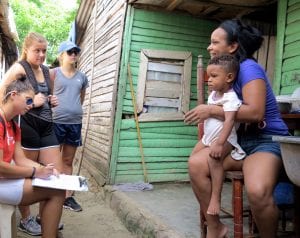Culture is extremely important in the world of humanitarian aid. Most people fail to recognize that culture is never static, that all cultures are different from one another. Most organizations put each country in a “one-fits-all” packaging in that aid in one country will work well in another country. Moreover, ethnocentrism exists as the way one looks at other cultures through the lens of their own culture. As P rofessor Bruce Whitehouse of Lehigh University says, “If anthropology has taught me anything, it’s that we should always consider, before intervening to help people of another culture, whether they perceive the problem the same way we do.” Being insensitive towards another’s culture fuels a cultural gap, or a “cultural disconnect” (Ethan Watters). It is when cultural relativism – the principle of regarding the beliefs, values, and practices of a culture from the viewpoint of that culture itself – arises that this cultural gap can be diminished. When the cultural gap is not bridged, volunteer’s efforts can lead to episodic solutions and development. Humanitarian organizations and volunteers who don’t acknowledge the importance of the host country’s culture are unable to evaluate correctly the needs of the host community or communicate effectively with the host community. In order for volunteering in foreign countries to be deemed effective, one must familiarize themselves with the culture they are helping which can generate enduring solutions.
rofessor Bruce Whitehouse of Lehigh University says, “If anthropology has taught me anything, it’s that we should always consider, before intervening to help people of another culture, whether they perceive the problem the same way we do.” Being insensitive towards another’s culture fuels a cultural gap, or a “cultural disconnect” (Ethan Watters). It is when cultural relativism – the principle of regarding the beliefs, values, and practices of a culture from the viewpoint of that culture itself – arises that this cultural gap can be diminished. When the cultural gap is not bridged, volunteer’s efforts can lead to episodic solutions and development. Humanitarian organizations and volunteers who don’t acknowledge the importance of the host country’s culture are unable to evaluate correctly the needs of the host community or communicate effectively with the host community. In order for volunteering in foreign countries to be deemed effective, one must familiarize themselves with the culture they are helping which can generate enduring solutions.
https://www.youtube.com/watch?v=D5-gU7VG3bg
Understanding → A lack of understanding local values through race and religion can impose harmful connotations during the administration of aid.
- Race → Greg Beckett introduced the idea how some Haitians feel as if they are being equated to dogs. Immediately, this connotes how Haitians are being disempowered as they are the recipients of aid “owned” by the donors and volunteers. If a volunteer isn’t culturally aware of the differences in race, he/she creates this power hierarchy, something that is to be avoided when helping those in underdeveloped communities. If one is to be thought of as “below” in the power hierarchy, he/she is in a state of learned helplessness, and this state prohibits one from being hopeful that their physical, social and/or economic state will change.
- Religion → The enforcement of a religion on a community could result in the hosts betraying their own beliefs just so that they could receive aid. Sometimes faith-affiliated organizations would make aid recipients sit through sermons or say prayers in order to get medical help in which most from underdeveloped countries would not seek help at all. Those who turn away from this aid aren’t willing to betray their own beliefs in order to adopt someone else’s, even though they might have desperately needed help.
Language → Language is a manner of communication, and if communication fails, aid fails.
- As Susan Knell, a clinical psychologist, states in her chapter of Khanjan Mehta’s Solving Problems that Matter, “Language includes many cultural values and norms; it is not just a matter of learning new vocabulary and pronunciation. This is true even in English where different English-speaking countries use different words to capture the same idea. Embracing a new language will provide you with insight that will not be available to you if you conduct all your interactions in English.” Even if it doesn’t involve knowing how to carry a conversation directly with someone in the host country, Judith Lasker mentions how one should take the ti
 me to learn how to greet one another in the host’s’ culture in her book Hoping to Help. For example, one would greet someone in Thailand using the wai, the act of pressing both hands together in front of them and bowing slightly.
me to learn how to greet one another in the host’s’ culture in her book Hoping to Help. For example, one would greet someone in Thailand using the wai, the act of pressing both hands together in front of them and bowing slightly. - A prime example of this occurs in Haiti, where locals believe that AIDS is sida, and that people become sick as a result of sorcery. Because of this, they turn to voodoo witch doctors instead of trained medical professionals. Healthcare workers need to be cognizant of this in order to address the Haitians in an educated and respectful way (Paul Farmer).
- Aid fails from miscommunication through language since not knowing a language can even lead to exclusion within the local community. When volunteers don’t know the host country’s language, it excludes locals from participating. Local participation is essential since they are the ones being helped; thus, they need to be understood, talked to, communicated with.
- In Haiti, some donors don’t even speak or communicate to NGOs in its language, Kreyol: “These groups considered ‘partners’ subsequently critiqued the process for running roughshod, without meaningful dialogue and participation, no mechanisms in place for debate, not enough time for discussion, noting in Kreyol” (Mark Schuller, 161). Communicating in French led to the exclusion of most Haitians in the NGOs, and the distribution of aid came solely from the NGO’s “partners.”
Trust → Distrust can arise from volunteers not knowing a host community’s culture. This unbalance can lead to the volunteers taking over the project and initiative from the locals, which only provokes the absence of local participation.
Unity → When a volunteer understands the culture that they are entering into, they are more likely to be able to relate and effectively interact with those that they are helping. For instance, if a volunteer who knew the language and local customs came to a village, they would typically be more well-received than a volunteer who speaks none of the language and has no knowledge of the norms of the local village. In order for a volunteer or humanitarian group to be unified with those they are serving, they must be able to communicate and interact with those they are helping. Unity and trust go hand-in-hand, because when volunteers are one with the people they are helping, they are less likely to do harmful things to the community.

Respect → It is necessary to be culturally tolerant when helping others. A cultural disconnect can stem due to a lack of respect, which can infer that one isn’t volunteering for altruistic reasons, but perhaps in a more selfish manner.
Experience → The lack of knowing the local language can affect a volunteer’s experience. Professor Noelle Sullivan mentioned how regardless of language, a volunteer is able to “see the delivery of the aid” being implemented, but when one doesn’t know the host country’s language, the volunteer is missing out on learning experiences. For instance, in Tanzania, sometimes relatives would need to help local doctors since they better understand the culture and language than the volunteers. A lack of being immersed into the country’s cultural aspects before visiting can also affect the volunteer as they won’t know the everyday normalities of the country.
- For example, the everyday food eaten may be much different from what the typical volunteer is used to. In some cases, the

© M. Perlman volunteer would resort to food they would typically find in their home country, but this defeats the purpose of being integrated into the host community’s culture.
All of these factors affect the way in which aid can be carried out. Focusing in on the host country’s culture can lead to better understanding of situations and experiences that could only lead to more enduring solutions, sustainable development. Learning about a culture can come from a textbook, or through direct experiences. However, just make sure that the organization you work with aligns with the values that you have, and the values in this guide.
FOCUS ON CULTURE, and do so with trust, understanding and respect.
Page by Lexi Harris, Ginger Pojednic and Maggie Perlman
What do you personally think is the most important aspect to culture using our acronym? Take our poll and see what others have to say!

